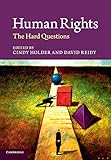
Human rights : the hard questions
pbk
- 著者名edited by Cindy Holder and David Rei
- 出版者Cambridge University Press
- 出版年2013
貸出・返却・予約状況
- 所蔵数1
- 貸出可能数1
- 予約数0
- 貸出累計1
所蔵事項
- 登録番号0010878B
- 請求記号091.3-HO
- 貸出区分通常
- 蔵書区分図書 - 一般図書
- 所蔵館本館
- 配架場所開架書架
- 所蔵状態所蔵
ブックリスト
書誌事項
- 書名Human rights : the hard questions
pbk
- 著者名edited by Cindy Holder and David Rei
- ISBN9780521176262
- 国名コードuk
- 言語コードeng
- 出版地Cambridge
- 出版者Cambridge University Press
- 出版年2013
- ページxv, 472 p.
- サイズ25 cm
- 注記Includes bibliographical references and index
- 件名LCSH : Human rights
- 内容内容説明
The United Nations General Assembly adopted the Universal Declaration of Human Rights in 1948. A burgeoning human rights movement followed, yielding many treaties and new international institutions and shaping the constitutions and laws of many states. Yet human rights continue to be contested politically and legally and there is substantial philosophical and theoretical debate over their foundations and implications. In this volume, distinguished philosophers, political scientists, international lawyers, environmentalists and anthropologists discuss some of the most difficult questions of human rights theory and practice: what do human rights require of the global economy? Does it make sense to secure them by force? What do they require in jus post bello contexts of transitional justice? Is global climate change a human rights issue? Is there a human right to democracy? Does the human rights movement constitute moral progress? For students of political philosophy, human rights, peace studies and international relations.
目次
・Introduction Cindy Holder and David Reidy
・Part I. What are Human Rights?: 1. Human rights and human nature Chris Brown
2. Universalism and particularism in human rights Neil Walker
?3. Are human rights universal? Rex Martin
Part II. How do Human Rights Relate to Group Rights and Culture?: 4. The significance of cultural difference for human rights Alison Dundes Renteln
5. Groups and human rights Peter Jones
6. Entangled: family, religion and human rights Ayelet Shachar
7. What does cultural difference require of human rights? Claudio Corradetti
Part III. What do Human Rights Require of the Global Economy?: 8. What do human rights require of the global economy? Beyond a narrow legal view Adam McBeth
9. Universal human rights in the global political economy Tony Evans
10. Human rights and global equal opportunity: inclusion not provision Ann Cudd
Part IV. How do Human Rights Relate to Environmental Policy?: 11. Human rights in a hostile climate Stephen M. Gardiner
12. A human rights approach to energy, poverty and gender inequality Gail Karlsson
13. Pollution wolves in scientific sheep's clothing: why environmental-risk assessors and policymakers ignore the 'hard issues' of the human rights of pollution victims Kristin Shrader-Frechette
Part V. Is There a Human Right to Democracy?: 14. Is there a human right to democracy? Hilary Charlesworth
15. The human right to democracy and its global import Carol Gould
16. An egalitarian argument for a human right to democracy Thomas Christiano
?Part VI. What are the Limits of Rights Enforcement?: 17. Is it ever reasonable for one state to invade another for humanitarian reasons? The 'declaratory tradition' and the UN charter Julie Mertus
18. Conflicting responsibilities to protect human rights Larry May
19. Searching for the hard questions about women's human rights Marysia Zalewski
20. Are human rights possible after conflict? Diary of a survivor Margaret Akello and Erin Baines
Part VII. Are Human Rights Progressive?: 21. Moral progress and human rights Allen Buchanan
22. Human rights and moral agency Mark Goodale
23. Gender mainstreaming human rights: a progressive path for equality? Laura Parisi.
「Nielsen BookData」 より